Muy interesante la conferencia que brindó Ricardo Homs el 21 de marzo a las 19:30 h para los campus de la ciudad de México del Tecnológico de Monterrey.
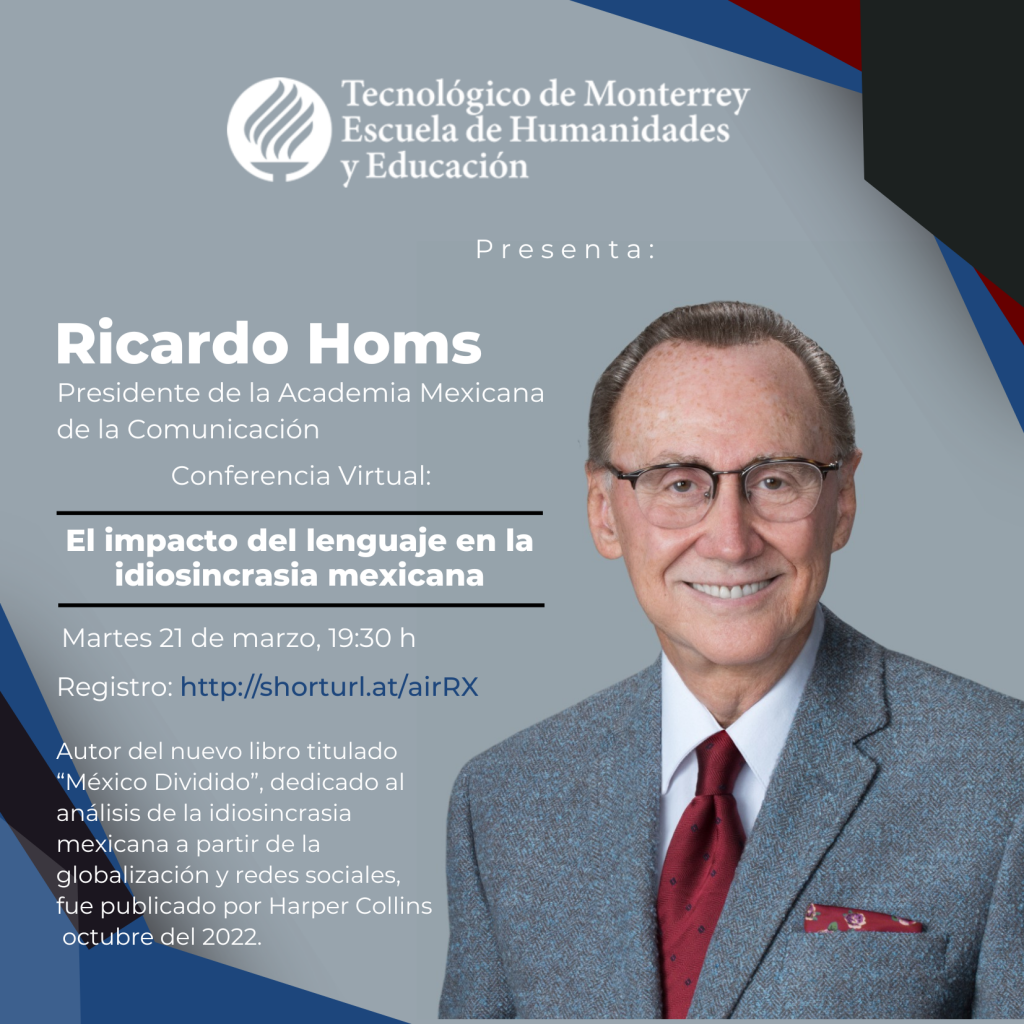
Aquí el video de la conferencia:
Muy interesante la conferencia que brindó Ricardo Homs el 21 de marzo a las 19:30 h para los campus de la ciudad de México del Tecnológico de Monterrey.

Aquí el video de la conferencia:
The New York Society for General Semantics is proud to present a special event titled “Democracy and Media Ecology” at the historic Players at 16 Gramercy Park South in New York City. Our event will take place on Friday evening, January 27th between 6pm and 9pm, and we hope you’ll register and join us for what promises to be a lively and engaging discussion.
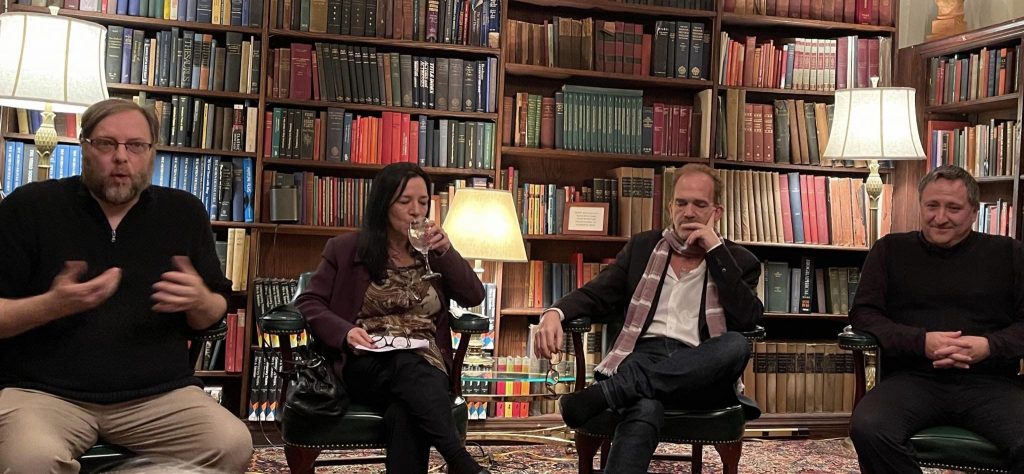
Date: 27 Jan 2023
Time: 6:00 PM – 9:00 PM
Location: The Players NYC – 16 Gramercy Park South, NY, NY
Media ecology entails the study of media as environments. Those things that go between us and what’s “out there” strongly influence the way we think, act, and communicate. Neil Postman famously called media ecology “general semantics writ large.” As our good friend Thom Gencarelli wrote in 2020, reviewing Postman’s role in both fields, “If general semantics considers our semantic environment, or context in which utterances take place, and the fact that the sense and sensibility and result of such utterances are to a great extent determined by that context, then the same holds true when we expand the concept of our semantic environment to consider our various media environments – wherein the nature of the medium, as a context, influences both the nature of utterances offered and the meanings we make from such utterances.”
This point is particularly valuable in attempting to understand how we shape our world through the choices we make in organizing and governing our affairs. Democracy is one system, method, or medium for engaging in that important work and therefore it’s important to consider the democratic shape of things as we seek to improve and progress as human beings. As democratic systems of various types become strained by the pace and intensity of our contemporary condition, we gather to consider what’s going on and what we might do about it.
Each January, the Executive Board of the Media Ecology Association holds its annual meeting in New York City, and the NYSGS is very pleased to have a number of principals of the MEA Board with us to share food, drink, and an evening of intellectual reflection.
Dr. Adriana Braga is Immediate Past President of the MEA and Associate Professor at the Social Communication Department at the Pontifícia Universidade Católica/Rio de Janeiro (PUC-Rio), Coordinator of the Digital Media Lab and researcher of the National Council for Scientific and Technological Development (CNPq, Brazil).
Dr. Thom Gencarelli is a Past President of the MEA, Treasurer of the NYSGS, and Editor-in-Chief of the Institute of General Semantics’ journal ETC: A Review of General Semantics. He is Professor and founding Chair of the Communication Department at Manhattan College.
Dr. Fernando Gutiérrez is the long time Executive Secretary of the MEA and the head of the Division of Humanities and Education at the Monterrey Institute of Technology and Higher Education (State of Mexico Campus). Dr. Gutiérrez is an author of several titles about media and information technologies; and part of the National System of Researchers in Mexico. His interest focuses on the exploration of different media environments.
Moderating the evening’s discussion is Dr. Michael Plugh, President of the MEA and the NYSGS. Dr. Plugh is Associate Professor in the Communication Department at Manhattan College.
We hope you’ll drop in to join us. Registration is free, but all attendees must be registered in order to gain admittance to the club. This includes any guests you might want to bring with you.
The program will take place in the Library on the 2nd floor of the club. Please note that, as an historic 19th century landmark, the site is not handicap accessible. Dress code is business casual and is strictly enforced, including no sneakers, shorts, ripped jeans, t-shirts).
Comparto la liga al al libro colectivo que editó Grupo Comunicar, bajo el liderazgo del Dr. Ignacio Aguaded, Arantxa Vizcaíno-Verdú, Ángel Hernando-Gómez y Mónica Bonilla-del-Río. El libro cuenta con 151 capítulos de más de 290 autores de 17 países euroamericanos que nos introducen en un panorama educomunicativo diverso en materia de investigaciones, estudios, propuestas y reflexiones, fundamentales para comprender nuestra convivencia con los medios y las plataformas digitales.
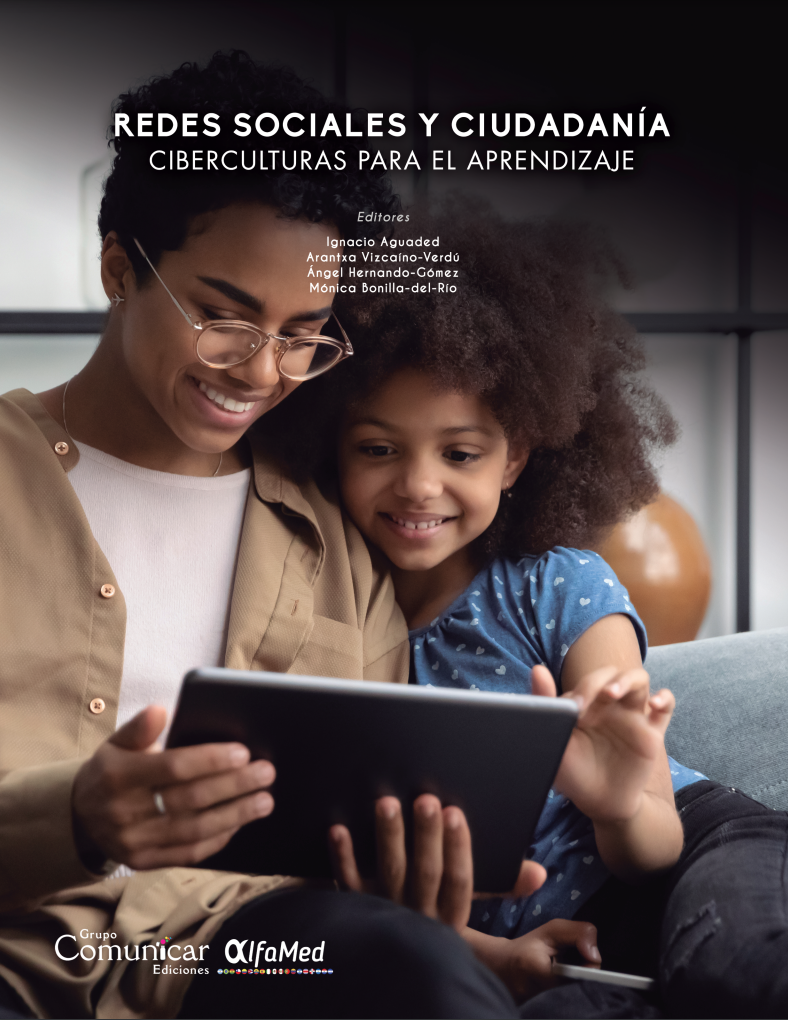
En esta obra participamos mi estimados amigos Octavio Islas y Amaia Arribas, y un servidor, con el siguiente capítulo:
[embeddoc url=”https://www.fergut.com/wp-content/uploads/2022/12/FdoGtz1027.pdf”]Comparto con ustedes esta entrevista que tuve en el programa Café de Innovación de la Comisión de Innovación y Emprendimiento de COPARMEX Metropolitano del Estado de México.
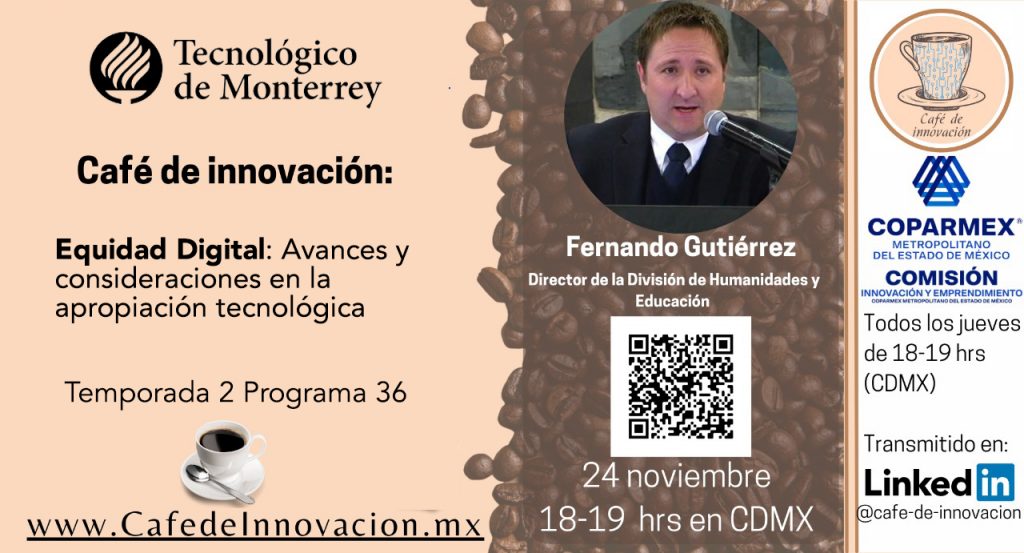
Aquí el URL del programa: https://www.linkedin.com/video/event/urn:li:ugcPost:7000650583527350273/
Aquí dejo la transcripción de esta editorial sobre la situación que atraviesa Twitter.
Renovarse o morir es la vieja disyuntiva que enfrenta actualmente una compañía como Twitter, que fue fundada hace casi 16 años por Jack Dorsey y un grupo de emprendedores. Hoy esta compañía –que ocupa el sexto lugar en uso en nuestro pais– enfrenta un gran reto, principalmente como consecuencia del cambio en su dirección general que derivó primero de la compra de la mayoría de las acciones por parte del multimillonario Elon Musk, quien terminó poco después por adquirir la totalidad de la empresa.
En sus inicios, la propuesta de Twitter fue muy buena y bien recibida por la mayoría de los usuarios de Internet. Un modelo de microblogging que permitía la transmisión de mensajes de 140 caracteres que heredó de los servicios de mensajes cortos, mejor conocidos por sus siglas en inglés SMS. Esto permitía que la información viajara rápidamente por Internet de un lugar a otro. Bajo este modelo la empresa comenzó a crecer hasta, llegar en 2012 (casi 5 años después de su fundación) a captar a más de 200 millones de usuarios, y bajo un modelo comercial que había instalado un par de años antes basado en la promoción y publicidad de mensaje dirigidos.
Sin embargo, el impedimento de uso de recursos visuales y audiovisuales, y la limitación de caracteres –que no tenía otras redes sociales con las que competía como Facebook–aunado a la aparición de nuevos actores que llegaban al mercado, como la plataforma de origen chino TikTok; fueron dejándo a la empresa atrás. Por otra parte, el ambiente que se propició en Twitter resultó muy hostil para las nuevas generaciones que decidieron optar por otras alternativas.
Hoy la plataforma tiene una nueva oportunidad para renovarse o morir. El destino está en las manos de un polémico pero experimentado emprendedor que desde su perspectiva desea hacer de twitter un nuevo espacio comunicativo funcional en el que sobretodo se preserve la libertad de expresión.
Para aquellos que les pueda resultar de interés, les dejo este material que presenté en el 𝐚𝐭𝐞𝐍𝐄𝐎 𝐝𝐞 𝐂𝐨𝐦𝐮𝐧𝐢𝐜𝐚𝐜𝐢𝐨́𝐧 𝐄𝐬𝐭𝐫𝐚𝐭𝐞́𝐠𝐢𝐜𝐚® 𝐒𝐢𝐬𝐭𝐞𝐦𝐚 𝐎𝐫𝐢𝐠𝐢𝐧𝐚𝐥. Un espacio orientado al co-working, al encuentro, a la exploración, a la provocación y al descubrimiento de los nuevos horizontes.
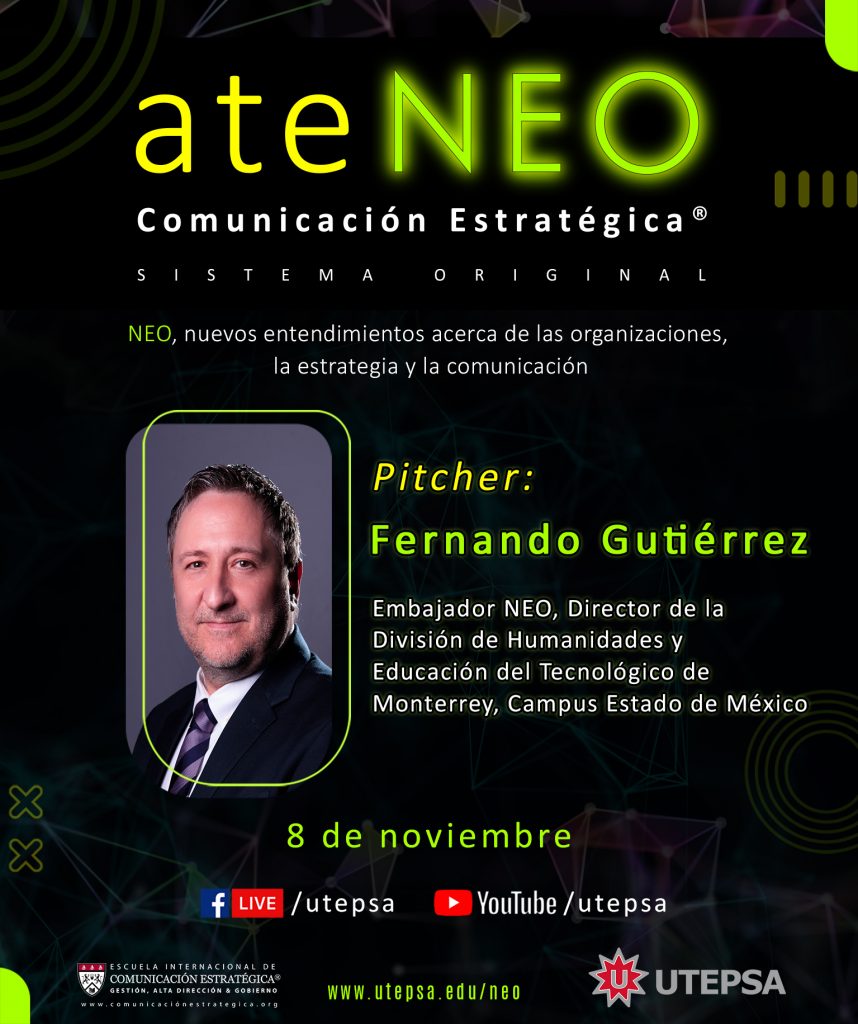
Agradezco a mis queridos amigos el Dr. Daniel Scheinsohn y Juan Carlos Peña (UTEPSA )por la amable invitación.
La presentación giró en torno al “El estratecom”, un concepto que propuso hace unos años mi querido amigo el Dr. Octavio Islas, y que hemos explicado él y yo ya en algunas publicaciones. Aquí les dejo el material de apoyo que utilicé por si les resulta de algún interés.
[embeddoc url=”https://www.fergut.com/wp-content/uploads/2022/11/Estratecom.pdf”]El 26 de octubre de este año tuve el privilegio de dictar una de las cuatro conferencias plenarias del VI Congreso Internacional Alfamed, que llevó como tema Redes Sociales y Ciudadanía: Ciberculturas para el aprendizaje. El evento tuvo lugar en Arequipa, Perú del 26 al 28 de octubre de 2022.

La conferencia tuvo como nombre La comprensión del entorno digital actual desde la perspectiva de la ecología de medios.
Comparto con ustedes parte del material de apoyo que utilicé durante la conferencia:
[embeddoc url=”https://www.fergut.com/wp-content/uploads/2022/11/FdoGtz_EcolMed.pdf”]Mis estimados amigos Juan Fernando Muñoz y Marco López, me comparten la edición del libro: La formación en comunicación: visiones de una formación futura (conceptos y aproximaciones) en el que participan destacados académicos de diversos países.
Gracias a su invitación tuve oportunidad de aportar con la siguiente propuesta: El nuevo paradigma de la comunicación digital.
Aquí comparto el texto, esperando resulte de interés.
[embeddoc url=”https://www.fergut.com/wp-content/uploads/2022/11/ComDig.pdf”]Aquí un fragmento de la conferencia que tuvimos el martes 20 de septiembre con la Dra. Eva Berger.
Eva Berger is a professor of Media Studies at COMAS in Israel. She serves as Secretary of the Institute of General Semantics. She is co-author of The Communication Panacea: Pediatrics and General Semantics. She holds a Ph.D. in Media Ecology from New York University. Her latest book, Context blindness: Digital technology and the next stage of human evolution, was published by Peter Lang.
Eva Berger’s lecture – Context blindness: Digital technology and the next stage of human evolution – is based on her new book with the same title. The book’s thesis is that since we have delegated the ability to read context to contextual technologies such as social media, location, and sensors, we have become context blind. And since context blindness—or caetextia in Latin—is one of the most dominant symptoms of autistic behavior, people with autism may be giving us a peek into our human condition soon. Phenomena such as cancel culture, trigger warnings, and safe spaces are early signs. With increasingly frequent floods and fires and unbearably hot summers, the human footprint on our planet should be evident to all, but it is not because we are context blind. We are witnessing evolution in real-time and birthing our successor species. Our great-grandchildren may be a species very distinct from us: Homo caetextus.
Este artículo explora el fenómeno de asunción de identidades en las redes sociales y la influencia que tiene la inteligencia artificial (bots) para que agentes externos logren tomar ventaja de los momentos de vulnerabilidad de diversos sujetos. El tema se aborda desde la perspectiva que ofrecen los estudios de Jacques Lacan y René Girard, con el enfoque de la ecología de medios. La investigación se fundamenta en un análisis particular de manipulación en Twitter en torno del caso de la caravana migrante de 2018 y la propagación del discurso de odio.
[embeddoc url=”https://www.fergut.com/wp-content/uploads/2022/09/18523-PDF-público-103275-1-10-20220803.pdf”]Aquí comparto la liga completa al artículo: https://palabraclave.unisabana.edu.co/index.php/palabraclave/article/view/18523/7081
Para citar este artículo / to reference this paper / para citar este artigo
Gaal, J. C., Gutiérrez, F. y Miranda, Ó. (2022). Manipulación ideológica en redes sociales: acoso, engaño y violencia en el entorno digital. Palabra Clave, 25(3), e2539. DOI: https://doi.org/10.5294/pacla.2022.25.3.9